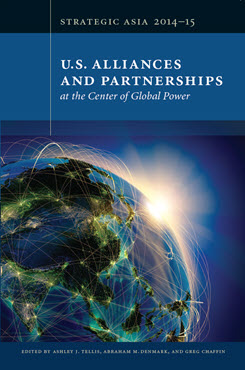The U.S.-Thailand Alliance
Continuity and Change in the 21st Century
This chapter from Strategic Asia 2014–15 assesses Thailand’s strategic role in Southeast Asia and the broader Asia-Pacific and considers the impact of the country’s return to military rule on relations with external powers, particularly the U.S. and China, as well as on regional integration.
EXECUTIVE SUMMARY
This chapter assesses Thailand’s strategic role in Southeast Asia and the broader Asia-Pacific and considers the impact of the country’s return to military rule on relations with external powers, particularly the U.S. and China, as well as on regional integration.
MAIN ARGUMENT
Thailand’s geographic position, the size of its economy, and its strong ties to both the U.S. and China have made it the major player on mainland Southeast Asia since the end of the Vietnam War. However, with Vietnam’s normalization of relations with the West and the major Asian powers in the 1990s and the re-emergence of Myanmar in the international community, Thailand’s dominant position has steadily eroded after a decade of political instability. Although military rule could provide some measure of short-term stability, it will do little to resolve Thailand’s fundamental political conflict. As a result, international partners, ranging from military powers to foreign investors, will be reluctant to write Thailand into their long-term plans. In particular, Thailand’s relations with the U.S. will be limited while the military remains in power, and the two countries will be unable to develop a joint vision of the future of the alliance during this time.
POLICY IMPLICATIONS
- Western sanctions on Thailand, although mild, will inhibit the progress of multilateral security cooperation in Southeast Asia.
- The U.S. reaction to the coup and continued military rule is focused on the security relationship. Washington will attempt to salvage key aspects of the U.S.-Thailand alliance, particularly access, while strengthening ties with other Southeast Asian countries.
- Constrained U.S.-Thailand military relations will have an impact on the Pentagon’s ability to develop security relations with Myanmar, since third-country dialogue and training options will be blocked.
Strategic Asia
The Strategic Asia annual edited volume incorporates assessments of economic, political, and military trends and focuses on the strategies that drive policy in the region. Learn more about Strategic Asia.


